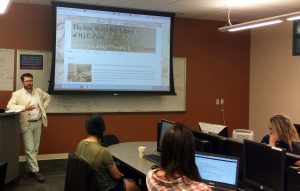By Ian Isherwood ’00
In September #TeamPeirs celebrated our two-year anniversary of going live. As anniversaries are a time for reflection, we thought we would contribute a few pieces on what #TheStaff has taken away from working on Peirs. As we are in the midst of a crowdfunding campaign to get us over to France in March 2018, we thought it might be of interest to our readers to know what its like to work on this project.
This project came along at a pivotal moment in my career. I received my PhD in 2012 and then went to work for Gettysburg College. My research focuses on the ways in which veterans of the Great War wrote about their war experiences. Much of my work is on war writing and memory: essentially, the role of writers and their books in shaping the popular memory of the First World War. After an initial spate of post-PhD publications on this topic, I got antsy for something new. Fortunately, I didn’t have far to look.
That Peirs’s descendant Marco Dracopoli was one of my students is a fact that I will be forever thankful and that his family encouraged me to do something with these letters is something for which I will always be grateful. Initially, after speaking with the family about the collection, I thought of editing the Peirs letters into a volume. But then after talking with some colleagues (a motley band of archivist, librarian, and self, the historian) we realized that there was an opportunity here to tell Peirs’s story to everyone. There was also a potential learning opportunity for our students to sharpen their unsheathed historical blades upon the whetstone of the digital humanities. Thus the fellowship of #TeamPeirs was formed – thus the Peirs project began.
So what have a learned after two years?
1) To embrace the on-line evolution of our work. Graduate training sometimes makes people hypercritical and overly cautious. The process of research is one of interrogation – asking hard questions to come up with reliable generalizations based on a wealth of diverse materials – and most of the time the business of history is collecting information towards some goal, like an article or a book. In Peirs, though, our mission is different. Here we are putting a bunch of documents online for the public and trying to build context as we go along. We have been learning how to build the site essentially ‘on the job.’ Our historical process – our methods – evolved as we have experimented with technology, social media, and informal blogging. For this buttoned-up-bow-tie of a ploddingly cautious historian with a predisposition to perfectionism, this system has proved scandalously adventurous and outrageously exciting. So I’ve learned to lighten up a little.

Self scratching head outside of the Imperial War Museum. Photo courtesy of Jenna Fleming, Peirs Intern 2014-2016.
2) That I like other people. Research is really, really (really) lonely. As exciting as it is uncovering new documents, at some point you realize as an historian that you spend a lot of time reading the mail of deceased persons, much of it dreadfully boring. In my last book, I worked out most of the garbled prose and methodological conundrums – not to mention the loneliness of my work – by talking to my dog, who 1) provided necessary company and emotional support but 2) wasn’t that helpful as a collaborator. With Peirs, though, there are real, live people who are passionate about the subject and who want to talk about it, learn from it, and work with me on making the best possible product we can. Collaboration has been way more fun than I ever thought and I have loved seeing, in particular, our interns hone their historical skills (and their digital literacy). The best part of the project for me has been the bonds formed by our team – under fire in the digital trenches – trying to figure out what we are all doing and our roles. It is no exaggeration to say that the thoughtfulness, excitement, and good cheer of my colleagues has made every aspect of this project enjoyable.
3) The gushy emotional aspects of impactful learning (related to No. 2). I have spent a decade researching and writing on the same subject. Most of that writing has been for an academic audience and the impact of any given academic article is in the hundreds (if I’m lucky). With this site, though, we can engage with a much broader and much more diverse audience than through traditional scholarship. Closer to home, I know that my students and colleagues have benefited from working on this material. In short, the work we are doing is impactful, in particular, with Gettysburg College students and our fantastic interns. Through working in the trenches on Peirs, we’ve all grown as a team, learned together new skills, and come together as comrades-in-arms in our commitment to the project. And, rather selfishly I have to say, I have found rejuvenated excitement towards my subject in working with my friends on Peirs.
So that’s that. Look here for the next reflection in the coming week from #TeamPeirs.

